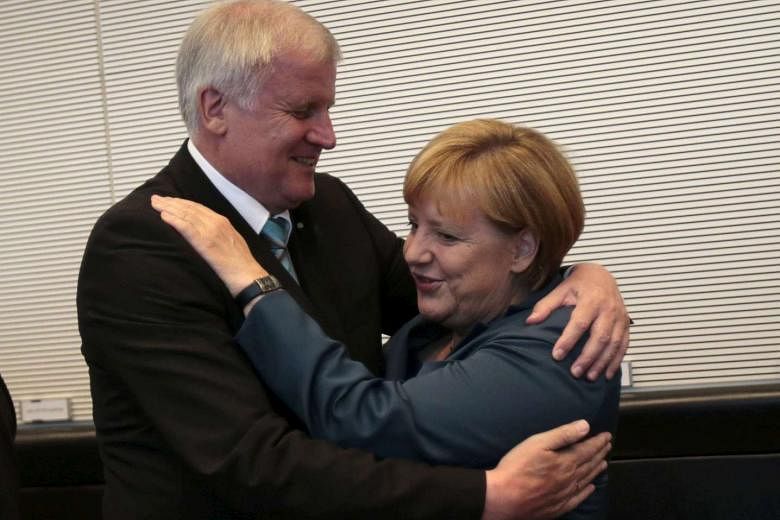BERLIN (Bloomberg) - German Chancellor Angela Merkel is holding emergency talks with party leaders this weekend to quell a revolt among her Bavarian allies over her handling of the biggest influx of refugees since World War II.
Back from a two-day trip to China, where the strain of the spiraling turmoil began to show, Dr Merkel will meet on Saturday (Oct 31) evening with Bavarian Premier Horst Seehofer, who has demanded she stem the flow of as many as a million newcomers into Germany this year. The two will meet on Sunday with Social Democratic leader Sigmar Gabriel, a coalition partner who opposes caps on refugees.
As Dr Merkel seeks to defuse the political unrest over her open-door refugee policy, she also confronts waning public approval for her insistence that Germany has a moral and legal obligation to protect all those seeking shelter from war and oppression.
Backing for her Christian Democratic Union (CDU) slipped two points to 36 per cent this week, down from an August peak of 43 per cent, according to a weekly poll carried out by Forsa.
"Support for Merkel is dropping," Ms Andrea Roemmele, a political scientist at the Hertie School of Governance in Berlin, said in an interview. "There is still huge potential for civil society to help and support, but she has to do something."
While rumblings have been more muted from within her Christian Democratic Union, her chief critic has been Mr Seehofer, chairman of the Christian Social Union (CSU), the CDU's Bavarian sister party.
His state has been inundated by thousands of refugees pouring over the border from Austria. Mr Seehofer said Bavaria would take unspecified action if Dr Merkel didn't meet his demands by Sunday to curb the number of migrants, while Dr Merkel has rejected caps on asylum seekers. Mr Gabriel, Dr Merkel's vice-chancellor, has turned on both, saying the Berlin-Munich quarrel was making the crisis worse.
"This type of mutual intimidation and abuse is unworthy and simply irresponsible," Mr Gabriel told Spiegel Online.
Even as she faces accusations from party allies that her policies have triggered an unsustainable wave of migrants, Dr Merkel is in no immediate political danger from lawmakers who don't have any appetite to topple her and seek a successor.
Still, the chancellor faces creeping isolation as a public initially lining up to welcome refugees begins to fret over the ever-mounting number of newcomers.
As a "super incumbent", Dr Merkel will be able to parry threats coming from the CSU and emerging from within her party, Ms Roemmele said. But, she added, "What she cannot lose is public support."
Dr Merkel has sought to sidestep the domestic squabbling, focusing on the geopolitical dimension of the region's refugee crisis, which has been compounded by the civil war in Syria and exposed the 28-member European Union's inability to settle on a strategy for responding to it.
After wading into an election campaign in Turkey this month to seek help in stemming the flow of migrants into the EU, Dr Merkel this week even courted China's leaders for assistance.
"We are deeply concerned about the refugee crisis currently taking place in Europe and particularly in Germany," Chinese Premier Li Keqiang said in Beijing at a joint news conference with Dr Merkel on Thursday. "We will continue to make our constructive contribution to the solution of the Syrian conflict."
Her global view will have to return to local politics as Dr Merkel's party gears up for three state elections next March, a precursor to 2017 national elections and a possible bid for a fourth term for the chancellor. For that, she'll have to engage with voters whose welcome is wearing thin.
The chancellor on Friday cut short a press briefing to wrap up her trip to China after a reporter departed from the topic at hand, asking whether the two days and 5,000 miles away from Berlin had reinvigorated Merkel to return to the turmoil at home.
"This is an important trip, but the things at home are just as important," Dr Merkel responded curtly before turning away from the cameras after a visit in a village outside the eastern Chinese city of Hefei. She skipped an originally planned second question.

